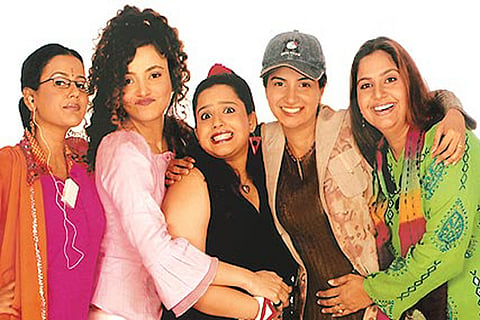

When I was 10 years old, my favourite television show was Hum Paanch, a sitcom about five sisters, each one a stereotype. Countless afternoons and evening were spent with Meenakshi the ‘belan wali’ feminist, Radhika the nerd, Sweety the ‘bimbo’, Choti the gossip…
And of course, Kajal ‘Bhai’.
Kajal ‘Bhai’ was a teenage gangster, a tiny person that most people were intimidated by, a ‘tomboy’ who referred to themselves with masculine pronouns.
And smitten fan that I was, so did I. For almost one whole year, while I tried to get used to a new city and a new school, I referred to myself as a boy. And while I wasn’t allowed to cut my hair, I put on a cap to tuck my plaits in.
(Of course, since I was a south Indian kid in a north Indian school, my classmates and teachers simply assumed I didn’t know to speak Hindi properly.)
My ‘boy phase’ ended - or at least, the use of masculine pronouns did.
But one question continued to bother me: What does it mean to be a girl, or a boy?
What does it mean to be a man or a woman? And are you always one or the other?
The easy - and wrong - answer to the first question is what the doctors told your parents when you were born: It’s the genitals that decide whether you’re a boy or a girl, whether you will be a man or a woman.
But if biological sex could put us cleanly into one box or the other, we would all either be Narendra Modi with a 56-inch chest, or a size zero Barbie Doll.
The truth is that even biological sex doesn’t neatly fit into two boxes, one blue and one pink. No one is ‘born’ a boy or a girl, we’re born as babies, as persons, and nothing else. While some are born with a penis, others are born with a clitoris and a vagina - yet others are born with ‘ambiguous’ genitalia, neither what we believe is male, nor what we believe is female.
Some intersex persons have chromosomal variations different from the simplistic xx and xy that we’re taught in school, others have hormonal variations that don’t subscribe to what we largely understand as male and female.
And in all this diversity, it’s doctors who assign a sex to a baby - by just glancing at their genitals. In the case of intersex babies, they even perform ‘corrective’ surgeries on them.
Transgender persons will tell you that the anatomy you’re born with has little to do with whether you identify as a woman or a man. You could be assigned male at birth and go on to identify as a woman, or vice versa.
And this diversity exists across the natural world, not just in humans.
So if it isn’t ‘biology’, what else could it be?
Is it the clothes you choose to wear that define whether you’re a man or a woman? In which case, would a woman wearing trousers then be a man? Would a man wearing a lungi in London be a woman?
Absurd, right.
So if it isn’t biology or clothes, is it ‘masculinity’ and ‘femininity’ - those random characteristics ‘assigned’ to each gender? Is it how assertive you are that decides you’re a man or a woman? Is it the strength of your handshake, the size of your biceps, your ability to change a car tyre or climb a tree? Is it your ‘intrinsic’ skill at art, your natural maternal instinct, your capability in the kitchen?
Again, quite absurd if those were the standards for calling someone a man or a woman.
Every person has what we call masculine and feminine qualities - and while there is no way to ‘measure’ either, no matter what Facebook quizzes tell you, even if you could give percentages of either randomly labelled quality, that still wouldn’t determine the gender of a person.
So far, there is only one thing that can definitively tell us a person’s gender - the person themselves.
While we express ourselves with the clothes we choose to wear and the way we talk and the way we walk - our gender identity is only what we say we are.
I am a woman because I identify as a woman, for the most part. Sometimes, I’m a boy and that has nothing to do with the clothes I choose to wear. Increasingly, I realise that my gender doesn’t matter to how I perceive myself - what matters, to me, is whether I am learning more every day, being a better person than yesterday, whether I’m keeping my temper in check and chasing happiness instead of some invisible labels that other people give out.
What also matters is how the people in the world treat me, on the basis of what they perceive my gender is. What matters are the opportunities that I - and you and the person sitting next to you - get, on the basis of what society decides as our due.
This Women’s Day, question the assumptions about what it means to be a man and what it means to be a woman. Think about what these words mean and how these labels affect you as a person.
This Women’s Day, break the gender binary just a little bit more.
Watch: